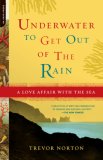Summary | Excerpt | Reviews | Beyond the Book | Readalikes | Genres & Themes | Author Bio

Critics' Opinion:
Readers' Opinion:
First Published:
Jun 2006, 400 pages
Paperback:
Jun 2007, 400 pages
 Book Reviewed by:
Book Reviewed by:
BookBrowse Review Team
Buy This Book
Bathers were indeed forcibly submerged by burly female
‘dippers’ – ‘hideous amphibious animals’, according to the artist Constable. The
shock of those icy waters was fundamental to the cure, for it was well known
that the ‘terror and Surprize, very much contracts the nervous membrane and
tubes, in which the aerial spirits are contained’. Scarborough assured its
patrons that it had the coldest water of all.
In all senses the melancholia, worms and putrefaction were
washed away with the tide. This gave nature’s seaside sanatorium the edge over
inland spas where, as Tobias Smollet feared, invalids with running sores might
convert the warm baths into cauldrons of infection keen to dart into his open
pores. Worse still, what if the bathwater got into the pump from which he drank
the mineral water, and he was swallowing the ‘sweat, dirt and dandruff and the
abdominal discharges of various kinds, from twenty diseased bodies, parboiling
in the kettle below’? No, the chill and voluminous sea was undisputedly a safer
kettle of fish.
The ‘beach’ had been invented and many city dwellers would
see the horizon for the first time. They came to enjoy the whipping of the waves
which ‘invigorates all parts’, and a confrontation with the ‘congenial horrors
of unrestrained nature’. Others succumbed to a massage with freshly gathered
seaweed, or simply admired the bathing beauties from afar while simultaneously
celebrating the invention of opera glasses.
The lure of the seaside was that people were liberated to
let their hair down in public, both metaphorically and literally. After bathing,
a woman’s wet tresses had to be brushed and the beach was the only place where
they might be viewed free from the nets and buns in which they were normally
imprisoned.
As soon as the ‘lower class’ arrived, they seemed to ‘give
up their decorum with their rail ticket and to adopt practices which at home
they would shudder to even read of’. Indeed, ‘men gambol about in a complete
state of nature’ and women frolic with only ‘apologies for covering’. In 1866,
the Scarborough Gazette
contained angry letters claiming that a healthy recreation had been
turned into ‘an immoral and depraved exhibition’. On the other hand, traders
knew from experience that ‘if first-class visitors are obliged to wear drawers
when bathing . . . Scarborough will lose its fame’. New by-laws divided up the
beach into bedrawed and knickerless sections.
Scarborough Spa prospered. The visitors’ book read like a
Who’s Who of high society. The town published a weekly gazette to list all the
important new arrivals. It was the first to have bathing machines and had forty
of them by the 1780s. Arcades, a covered promenade and assembly rooms were built
to occupy the bathers when they were out of the water or if, inevitably, it was
raining. Seaboard towns all over Britain followed Scarborough’s lead, each
boasting saltier water than the others, or younger female bathing attendants, or
fewer of those wicked waves that ‘annoy, frighten and spatter bathers
exceedingly’.
In the 1850s you couldn’t step on the English coast without
tripping over a resort bulging with ‘attractions’. Visitors were deafened by the
noise of barrel organs and brass bands.
But by the 1950s, when I came, even the grand buildings of
Scarborough were about to fall on hard times. The desire to retire to the
seaside to await death gave some places a bad name. Deadly Llandudno had the
highest death rate in Britain.
In Whitley Bay, most of the iron railings had been melted
down during the war and dropped on Hitler. The few that remained received their
annual overcoat of royal-blue gloss, covering an undercoat of rust.
Copyright 2006, Trevor Norton. Reproduced with permission of the publisher, Da Capo press. All reights reserved.





The Flower Sisters
by Michelle Collins Anderson
From the new Fannie Flagg of the Ozarks, a richly-woven story of family, forgiveness, and reinvention.

The House on Biscayne Bay
by Chanel Cleeton
As death stalks a gothic mansion in Miami, the lives of two women intertwine as the past and present collide.

The Funeral Cryer by Wenyan Lu
Debut novelist Wenyan Lu brings us this witty yet profound story about one woman's midlife reawakening in contemporary rural China.
Your guide toexceptional books
BookBrowse seeks out and recommends the best in contemporary fiction and nonfiction—books that not only engage and entertain but also deepen our understanding of ourselves and the world around us.